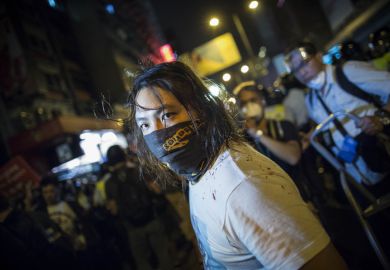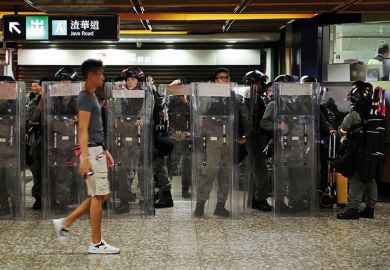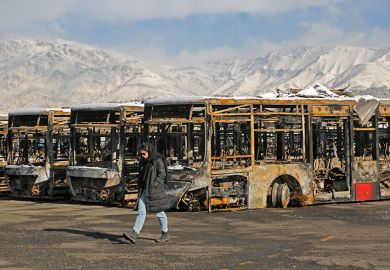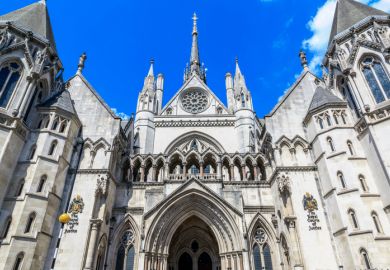Hong Kong universities have been urged to assert their status as bastions of academic freedom in the wake of violent police crackdowns on campus protests.
The “most immediate test” would be how higher education institutions respond to the potential prosecution of some of the more than 1,000 students who have been arrested during recent demonstrations, said Steve Tsang, director of the China Institute at SOAS, University of London.
“Will universities give them support and help them to find ways to complete their degrees or terminate them? No one would have a problem with universities cooperating with police for normal criminal charges, but for protesting – seen as political crime at best – it is a different matter,” Professor Tsang told Times Higher Education.
Universities will have to contend with this issue while, in some cases, repairing the damage caused by running battles fought between barricaded protesters and the police. Hong Kong Polytechnic University, the scene of the worst violence, described its campus as being in “complete disarray”.
Michael O’Sullivan, associate professor in the department of English at the Chinese University of Hong Kong – also the scene of serious violence – said that any impact on universities’ reputations “depends very much on the response of academics, journalists and public figures to what are ongoing attacks on university life”.
“Student protests in Berkeley in 1967 and in the Sorbonne in Paris in 1968 only added to the reputation of these university hubs as important centres for liberal education that privilege and protect freedom of speech,” he said.
“I would like to think that, following the appropriate academic response to the recent crisis, something similar might be possible for Hong Kong, since its status as a central education hub in Asia where students valiantly stand up for freedom of speech and against totalitarian agendas is now surely clearer than ever before, especially since so many students and non-violent protesters have told me they are willing to sacrifice so much for Hong Kong and its core values.”
All Hong Kong universities have already cancelled in-person classes and exams for the rest of the term following the protests, which are tied to long-running larger demonstrations against perceived police violence and threats to Hong Kong’s judicial independence by the Chinese authorities.
Gerard Postiglione, coordinator of the Consortium for Higher Education Research in Asia at the University of Hong Kong, said, “Hong Kong will recover; it has always been a bounce-back city.
“The universities and education system recovered from the 1967 riots, from the Asian economic crisis of 1998 and from the SARS crisis of 2003. The 1992 Los Angeles riots did not hurt UCLA, USC or Caltech, so why should Hong Kong be any different?” Professor Postiglione said.
“The current leadership of the universities has already shown itself as having a strong commitment to dialogue with students and a sustained engagement with alumni and the academic community; the laws of Hong Kong ensure that the universities will have a high degree of institutional autonomy and academic freedom; [and there is] a tradition of reaching out to attract talented scientists and scholars from around the world. There is no reason the universities cannot regain their traction in these three respects.”
POSTSCRIPT:
Print headline: Universities urged to assert freedom in Hong Kong
Register to continue
Why register?
- Registration is free and only takes a moment
- Once registered, you can read 3 articles a month
- Sign up for our newsletter
Subscribe
Or subscribe for unlimited access to:
- Unlimited access to news, views, insights & reviews
- Digital editions
- Digital access to THE’s university and college rankings analysis
Already registered or a current subscriber?








